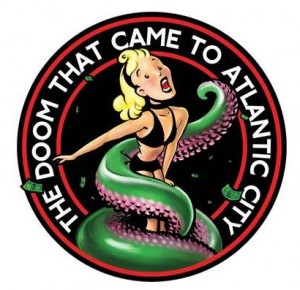Welcome to Purple Pawn, covering games played around the world by billions of people every day.
Creator Settles Charges With FTC Over The Doom That Came To Atlantic City
11 Jun
Posted by David Miller as Modern Board Games
 The U.S. Federal Trade Commission today announced the settlement of its first case for a failed crowdfunding campaign and it’s for a board game project. Erik Chevalier, doing business as The Forking Path, raised nearly $123,000 via Kickstarter for The Doom That Came To Atlantic City but failed to produce the game or issue refunds. The FTC found that instead of putting the money raised in to production of the game, Chevalier spent backer funds on personal expenses, such as rent. A press release from the Commission quotes Director Jessica Rich:
The U.S. Federal Trade Commission today announced the settlement of its first case for a failed crowdfunding campaign and it’s for a board game project. Erik Chevalier, doing business as The Forking Path, raised nearly $123,000 via Kickstarter for The Doom That Came To Atlantic City but failed to produce the game or issue refunds. The FTC found that instead of putting the money raised in to production of the game, Chevalier spent backer funds on personal expenses, such as rent. A press release from the Commission quotes Director Jessica Rich:
Many consumers enjoy the opportunity to take part in the development of a product or service through crowdfunding, and they generally know there’s some uncertainty involved in helping start something new. But consumers should able to trust their money will actually be spent on the project they funded.
Kickstarter’s Terms of Use at the time of the project required project owners to fulfill all promised rewards or issue refunds. Backers of $50 or more for The Doom That Came To Atlantic City were to get a copy of the game.
The FTC settlement order prohibits Chevalier from making any misrepresentations or failing to issue refunds with regard to any crowdfunding campaign, or disclosing or benefiting from backers’ personal information. The order also imposes a $112,000 judgement, though the obligation is suspended because of Chevalier’s inability to pay, and various reporting requirements for a period of 18 years. The settlement does not require Chevalier to admit any wrongdoing.
The Doom That Came To Atlantic City game was eventually produced and sold by Cryptozoic without the involvement of Erik Chevalier.
No Comments
Sorry, the comment form is closed at this time.
Trending
- Massdrop.com
- Oh the Irony—Illuminati Card Game Continues to Inspire Conspiracy Theorists
- Footprints, an Educational Ecology Game
- USPS Adds Board Game Flat Rate Box
- Home
- Baila, the Estonian Drinking Card Game
- Crystal Caste Wins Dice Patent Suit Against Hasbro
- Mirror Game, Red and Blue
- Hasbro and Mattel Merger?
- Are Board Games Dangerous?
Archives
Most Popular Articles
- Oh the Irony—Illuminati Card Game Continues to Inspire Conspiracy Theorists
- The 20 Most Valuable Vintage Board Games
- The Truth About Dominoes On Sunday in Alabama
- Sequence Game, and Variants
- USPS Adds Board Game Flat Rate Box
- Baila, the Estonian Drinking Card Game
- The 13 Most Popular Dice Games
- Are Board Games Dangerous?
- Guess Who? The Naked Version
- What Happened to the Jewel Royale Chess Set?
Recent Posts
- Toy Fair 2019—Breaking Games
- Talisman Kingdom Hearts Edition
- Toy Fair 2019—Winning Moves
- Toy Fair 2019—Games Workshop
- Toy Fair 2019—Star Wars Lightsaber Academy
- Toy Fair 2019—Stranger Things Games
- Toy Fair 2019—HABA
- Licensing Roundup
- Game Bandit
- 2018 A Difficult Year For Hasbro But Not For D&D Or MtG
Recent Comments
- on Toy Fair 2019—Winning Moves
- on Game Bandit
- on Second Look—Dungeons & Dragons Waterdeep Dragon Heist
- on Crowdfunding Highlights
- on Beyblade SlingShock
- on Game Bandit
- on Game Bandit
- on Watch This Game!, the Board Game Review Board Game
- on Second Look—Vampire: The Masquerade 5th Edition
- on Palladium Books Loses Robotech IP License, Cancels Five-Year-Overdue Robotech RPG Tactics Kickstarter




